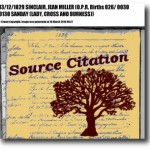Search results
Genealogy Quotes: In the Words of our Ancestors
May 8, 2012 by ramona
Filed under Articles, Family History, Latest News
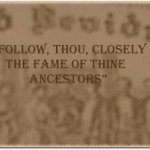
Family name, lineage, bloodline, pedigree, family tree and genealogy are all words that resound with a wish to be remembered and a desire to honor our forebears.
Our desire to celebrate our ancestors has possibly been around as long as we have and so have genealogy quotes, proverbs and sayings.
From the “begats” of the Christian bible that trace the lineage of Jesus, to the significance of “Word Fame” to the Vikings. The importance placed on our family trees is reflected in proverb, archaic literature and the current popularity of websites dedicated to genealogy quotes. Just type the phrase “Genealogy Quotes” into Google and you will come up with 11,600,000 results.
Wise words such as this ancient Gaelic proverb:
“Follow, thou, closely the fame of thine ancestors” (lean-sa dlùth ri cliù do shìnnsear) is perhaps one of the oldest recorded Western European genealogy quotes and one that continues to inspire family history hunters.
If you are in need of some inspiration or just love to reflect on the words of wisdom left by past generations – about past generations. You are going to love Genealogy Beginner’s list of :
Genealogy Quotes: In the Words of our Ancestors
“Distinguished ancestors shed a powerful light on their descendants, and forbid the concealment either of their merits or of their demerits”
Gaius Sallustius Crispus (86 BC – 35 BC)
“He who boasts of his ancestry praises the merits of another”
Seneca (4 BC – 65 AD)
“It is indeed a desirable thing to be well descended, but the glory belongs to our ancestors”
Plutarch (45–120 CE)
“To forget one’s ancestor’s is to be a brook without a source, a tree without root”
Chinese Proverb
“The mark of a Scot of all classes [is that] he … remembers and cherishes the memory of his forebears, good or bad; and there burns alive in him a sense of identity with the dead even to the twentieth generation.”
Robert Louis Stevenson (1850-1894)
“Cattle die, kinsmen die, one day you yourself shall die, but the reputation of the dead never dies.”
Havamal
“He who has no fools, knaves, or beggars in his family was begot by a flash of lightning”
Old English Proverb
“We need to haunt the house of history and listen anew to the ancestors’ wisdom”
Maya Angelou
“People will not look forward to posterity, who never look backward to their ancestors.”
Edmund Burke (1729-1797)
Feeling inspired? If you want to learn genealogy start with Genealogy Beginner
Why Learn Genealogy?
April 27, 2012 by ramona
Filed under Articles, Getting Started in Genealogy, Introduction to Genealogy, Latest News
 Have you ever wondered why genealogy and family history research is so popular? What is it that drives people to spend so much of their money and time pursuing their ancestral past?
Have you ever wondered why genealogy and family history research is so popular? What is it that drives people to spend so much of their money and time pursuing their ancestral past?
On a personal level it may start with a question of self-identity “Who am I?” or a need to know where we belong “Where do I come from?”
In 1964 psychologist H. J. Sants, coined the term “Genealogical Bewilderment” in describing identity issues in adoptees, Sants theory declared that adopted children experienced a greater degree of stress than children raised by their genetic parents due to an absence of knowledge of their origins.
In 1952 a letter was written to the Journal of Mental Health by psychiatrist E. Wellisch, titled “Children without genealogy: The problem of adoption” in which he said:
“Knowledge of and definite relationship to his genealogy is … necessary for a child to build up his complete body image and world picture. It is an inalienable and entitled right of every person. There is an urge, a call, in everybody to follow and fulfill the tradition of his family, race, nation, and the religious community into which he was born. The loss of this tradition is a deprivation which may result in the stunting of emotional development.”
While not everyone who engages in genealogy as a hobby is suffering from an identity crisis, there is still an echo of truth in these words.
Perhaps we feel a little disengaged from the far off shores of our homelands or maybe the answer lies in the theory of ancestral memory as expressed by Carl Jung’s “collective unconscious”, Freud’s “archaic remnants” or the more modern idea of “genetic memory”. All theories which at their heart suggest that within each individual is a body of knowledge or a memory passed down through our ancestors.
Speculation and pseudoscience aside there is no doubt that genealogy has become a popular hobby. The most current report on market trends for genealogy by Global Industry Analysts, Inc. (statistics as of January 11, 2012) show that between US$1000 to US$18000 is spent per year on genealogy research by over 84 million genealogists.
Ultimately, the why of genealogy research can only be answered by the individual pursuing it and perhaps it is best left at that. However, one thing all of us addicted to climbing our family trees can agree on is that it is one of the most rewarding hobbies around.
If you are ready to begin learning about your family tree start here at Genealogy Beginner.
The Language of Genealogy: Understanding Old Documents
April 24, 2012 by ramona
Filed under Articles, Getting Started in Genealogy, Introduction to Genealogy, Latest News
 Today’s language is quite different from the daily language of our ancestors. Some words and their meanings have all but disappeared from the modern lexicon.
Today’s language is quite different from the daily language of our ancestors. Some words and their meanings have all but disappeared from the modern lexicon.
For the Genealogy Beginner this can make reading old documents confusing if not outright frustrating.
Archaic Genealogical References
Recently I was assisting a novice genealogist in transcribing a document from the 1600s that they had been working on for some time. A huge part of the problem they were facing stemmed from an unfamiliarity of the language of the times. To make it worse the unfamiliar words were written in an abbreviated form of the times.
Transcribing old documents can be difficult enough on its own. The addition of archaic words and abbreviations that have no meaning in modern language simply makes the process nearly impossible; especially while simultaneously struggling with a old script in an aged document.
In this case, the words that were causing the problem were “Umqhuille”, “Relict” and “Milner”. Umqhuille is a word meaning deceased and Relict means Widow.
Milner in this time was a merchant who dealt in small, fancy goods. While the modern meaning of the word has changed to mean a seller of hats, the etymology of the word derives from Milan, from where many of these goods were once imported.
From working out the words, we were able to:
- Asses that the ancestor in question was deceased at the time of a particular baptism
- Recognize that one person on the document –Relict – was his wife
- Understand what his profession was
From this information, we added an additional generation to the family tree as the Umqhulille and relict named were the grand parents of the individual being baptized. This transcription also helped track down both a Will and a Sassine, which led to a great deal more information on the family researched.
This purpose of this little story is to demonstrate the importance of becoming familiar with the language of our ancestors. It is more than likely that novice Family tree hunters will run across some common and not-so-common old words while digging for their roots. For this, A genealogical dictionary would be a very helpful tool to have on hand.
Join us on the Ask a Genealogist Forum for a list of links to some excellent resources for archaic words, old occupations, medical terms and more.
Find Your Ancestors in Almanacs
April 1, 2012 by ramona
Filed under Articles, Genealogy Research Resources, Latest News, Sharing Genealogy Information
 Almanacs can be a great resource for genealogists and family historians. Along with weather predictions, advice for farmers and statistical information almanacs can contain tit bits of information about your ancestors that are not found in vital events documents or census. Additionally almanacs can give wonderful ephemeral information to round out your family history story and fill in your family template. Gutenberg printed the very first almanac in 1457 in Mentz, Germany and their use spread to almost every country by the 1600s. By the 1800s, it was possible to find yearly almanacs for nearly every county in Great Britain.
Almanacs can be a great resource for genealogists and family historians. Along with weather predictions, advice for farmers and statistical information almanacs can contain tit bits of information about your ancestors that are not found in vital events documents or census. Additionally almanacs can give wonderful ephemeral information to round out your family history story and fill in your family template. Gutenberg printed the very first almanac in 1457 in Mentz, Germany and their use spread to almost every country by the 1600s. By the 1800s, it was possible to find yearly almanacs for nearly every county in Great Britain.
The best way to demonstrate what a great resource an almanac can be is by looking in one for information. For this purpose “Peace’s Orkney Almanac and County Directory, 1886” gives us a great example of genealogical and family history information that.
The Family History Element
Within the front and back pages of the almanac, there is a wide range of advertisements that present a window into your ancestor’s daily lives.
From these advertising pages, we get a glimpse at the fashions of the times, modes of travel, an idea of how they may have approached emigrating to a new land and even some insight into daily chores.

Almanacs and Genealogy
An almanac contains a wealth of information in the trades sections. From listings of “Inspectors of the Poor” to a list of “Registrars of Births, Marriages and Deaths” that can be very helpful in pinpointing those questionable dates. Looking at this entry, we can see the timelines given to register any vital events.

Almanacs can also be used to help you find resources for records. Peaces Orkney and Shetland Almanac names all of the churches, clergy, schools and teachers in the county. It also gives the names of newspapers that were published at the time along with groups, society’s guilds and clubs, which are all fantastic sources of information for family tree research.
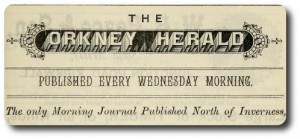
Additionally, it is common for almanacs to break up the directory listings by parish where you may find information that is more specific to your ancestor. Flipping to the directory for Sanday we find out that Peter Sinclair is listed as a member of the Parochial Board as well as a member of the School Board, which suggests he was an active member of his community. Not information found in a census, in fact almanacs are probably the number one place to look if you are searching for clues about your ancestors between census years.
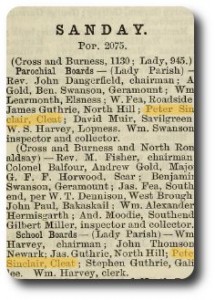
In this particular issue, we get lucky, as there is register of voters that not only lists the men but also gives a list of female municipal electors that predates women being given the right to vote in Great Britain. Looking at an almanac for genealogy can not only help locate ancestors and resources, it can also teach a few things that we may not learn from history books; such as areas where reform was more progressive. The pictures and stories of an almanac are one of those often forgotten information sources that can paint a surprisingly vivid picture of your family tree.
Image Credits: Ramona Hartley, Peaces Orkney Almanac and County Directory
Source: Internet Archives, National Library of Scotland
Rights: National Library of Scotland holds full rights in this digital resource and agrees to license the resource under the Creative Commons License: Attribution-Noncommercial-Share Alike 2.5 UK: Scotland.
Creative Commons license: Attribution-Noncommercial-Share Alike 2.5 UK: Scotland
Licenseurl: http://creativecommons.org/licenses/by-nc-sa/2.5/scotland/
“Finding Your Roots” Premiers Sunday
March 21, 2012 by ramona
Filed under Articles, Latest News
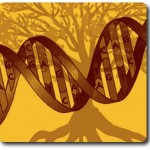
Mark your calendars for Sunday March 25 8pm EDT to watch the premier of “Finding Your Roots” with Henry Louis Gates, Jr.
Perhaps what makes “Finding Your Roots” one of the most interesting celebrity genealogy programs to date is the element of surprise as Gates escorts his guests through some shocking revelations in search of their ancestors.
Each episode features the genealogy of two or more celebrities. With the help of some leading American Genealogists, Family History experts and DNA samples. The show often links guests together in surprising ways using Autosomal DNA.
Scientists Joanna Mountain and Mike Macpherson of “23and Me” (genetics testing company) worked with “Finding Your Roots” to come up with some often-astonishing results. Proving relationships by degrees such as 3rd, 4th, 5th cousins (or more) is accomplished using the genetics company’s “Relative Finder” test.
This seasons 10 part series features a celebrity Line up of:
· Harry Connick Jr. and Branford Marsalis
· Cory Booker and John Lewis
· TV Personalities Barbera Walters and Geoffrey Canada
· Kevin Bacon and Kyra Sedgwick
· Angela Buchdahl, Rick Warren and Yasir Qadhi
· Samuel L. Jackson, Condoleezza Rice and Ruth Simmons
· Actors Maggie Gyllenhaal and Robert Downey, Jr.
· Sanjay Gupta, Margaret Cho and Martha Stewart
· John Legend, Wanda Sykes and Margarett Cooper
· Michelle Rodriguez, Adrian Grenier and Linda Chavez
Watch Preview on PBS. See more from Finding Your Roots.
How to Cite Family Tree Information Sources
March 2, 2012 by ramona
Filed under Articles, Genealogy Standards & Guidelines, Introduction to Genealogy, Latest News, Lesson 1 Articles
As a family tree enthusiast, you are probably aware that your genealogical information comes from multiple places such as government agencies, Old Parish Records, monumental inscriptions, online genealogy sites, books and newspapers. No matter where you found the information about your ancestors it is simply good practice to cite your sources. The basics of citing a source are simple.
Citing a Genealogy Source Consists of Naming:
- Who created the source (publisher, historical society, government agency)
- What the source was titled (John O’ Groat’s Journal)
- When the information was created (copyright or year of publication)
- Where the information was created (State, County, and/or name of publisher)
- How you found it (name of repository or archive)
- Why it is a good source (primary, secondary or tertiary source)
Citing sources is particularly important if you plan to publish your family tree to the internet and it helps all of us involved in family tree research to sort out the reliable information from assumptions and guesswork.
Citing Sources for the Genealogy Beginner Citing sources can also be time consuming and confusing if you are not familiar with how to cite properly a source of genealogical information. For starters, here are some general helps and guidelines to citing a source.
Genealogy Citation Guidelines:
- <angle brackets> are for internet addresses <https://www.genealogybeginner.com/>
- [brackets] are for descriptive information
- Information about publishers should be in
- (parentheses)
Always cite exactly what you have found along with where you found it If you have doubts either leave it out or note is as a supposition.
For example in the case of a Monumental Inscription:
PETER SINCLAIR, CATHERINE CALDER Erected By Peter Sinclair In Memory Of His Wife Catherine Calder Who Died At Greentoft, 21st March 1905, Aged 72 Years. Also Peter Sinclair, Born At Cleat, Sanday, 12th June 1830, Died At Greentoft, Eday, 3rd January 1917
Citation:
Orkney Family History Society , “Orkney Graveyard Search for: Sinclair in Eday & Pharay, Old Kirkyard, St Marys, Eday Orkney” (Orkney Family History Society ) [Ray Millar ] <http://www.orkneyfhs.co.uk/mis/minscriptions.php?opt=gyard&gref=151&surname=Sinclair> Report date: 04/03/12
note: Eday, Orkney, Scotland: Eday Old Kirkyard, Orkney, Scotland Plot: 329
It also helps to become familiar with the abbreviations used in citing your family tree information sources along with the standard formats used. Standard
Abbreviations for Genealogical Citations

Standard Format for Online Genealogical Citations
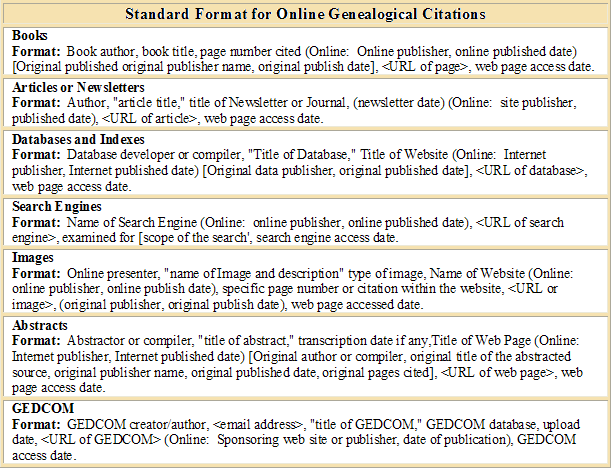
Citing your sources will give you the confidence to publish your family tree knowing that all of your hard work is beyond reproach. You can learn more about the importance of citing your family tree research and genealogy best practices in Genealogy Beginner’s Lesson 1: The Big Five Genealogy standards and guidelines: what you need to know first
Image Credit: Ramona Hartley
Genealogy: Crests, Coat of Arms and Surname Origins?
February 24, 2012 by ramona
Filed under Articles, Genealogy and Surnames, Introduction to Genealogy, Latest News, Lesson 5 Articles
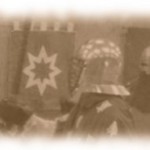
Have you ever searched for your surname in Google and come across websites for Family Crests, Coat of Arms and Surname Origins? If you are a genealogy beginner, you may even have gone to the website for information on your ancestors.
The real question here is how much value do these types of websites offer as a reliable source of information for your family tree research?
Surname origin websites, although highly entertaining and interesting, rarely have the information you really need. Many of them sell pre-written generic genealogies based on surname origin. Sadly, these genealogies often have nothing to do with sound family tree research and they can be misleading to those new to genealogy.
Surname Origins
For our first example, let us look at surname origin or surname history sites. Using the name Clegg in a Google search and randomly picking three sites, I find the following.
- The first site states that the Clegg surname “makes an impressive claim to being one of the oldest Anglo-Saxon surnames on record”. Then goes on to say the origins for the name hail from the “Rhine valley as far north east as Denmark”
- The second site surmises the Clegg surname is of English origin and comes from the Old Norse word “Kleggi” meaning at the foot of Owl Hill.
- A third surname origin website tells us that Clegg is an anglicized version of the Gaelic name “Mac Liaig(h)” which evolved into “Claque” and from there to Clegg. This site tells us that the name originates on the Isle of Mann.
From the above examples it is easy to see that while there may be a great deal of research and at least a grain of truth to each example, ultimately the information is contradictory and confusing. Therefore, while we all would like to know the origin of our family names Genealogy Beginner advises that it is best to regard these types of genealogy websites with a wee bit of skepticism.
Family Crests and Coat of Arms
Crests
A family crest historically is part of a family Coat of Arms or heraldry. It is called a crest because it was mounted on the top of a helm above the shield on a Coat of Arms. By the 13th century, a crest was used as a means of identification in tourney (think the movie – A Knights Tale) or on the battlefield.
Coat of Arms
A Coat of Arms also began as a way to identify an individual on the battlefield. Coat of Arms literally gets its name from a coat worn over armor or chain mail and was used initially to protect the armor or keep it cool under the hot sun during the crusades. Later it was decorated with identifying colors and designs in order to help distinguish friend from foe.
Ultimately a Coat of Arms is:
- An Armorial right that must be granted under due authority
- Usually the Crown or State
- Some governments (Canada) have the authority to grant the right.
Alternately, the right to bear arms can come from decent or “by virtue of ancestral right”.
What all this really means is that a coat of arms belongs to a direct family line and any website that tries to sell you your Coats of Arms is selling you a generic product that may or may not have anything to do with your lineage.
Overall, there is no real harm in surname origin or Coat or Arms websites so long as you are not misled into believing that they are an authority on your individual family tree. If you really want to know the origin of your surname (or whether or not there is a Coat of Arms associated with it) you will have to put the hard work into tracing your family tree as far back as you can, using well-established genealogy research techniques.
For more information on surname research, check out Genealogy Beginners Lesson Five: What’s in a Name?
Image Credit: Ramona Hartley
Google Books and Your Family Tree
February 6, 2012 by ramona
Filed under Articles, Genealogy Technology, Introduction to Genealogy, Latest News, Lesson 8 Articles
 Google Books can be an amazing resource for beginning genealogists. Whether you are looking for information specific to your family tree, something related to a current research interest like military records or general information on genealogy; Google Books is a good place to start.
Google Books can be an amazing resource for beginning genealogists. Whether you are looking for information specific to your family tree, something related to a current research interest like military records or general information on genealogy; Google Books is a good place to start.
To Find Google Books:
- Go to Google.com and hit the little arrow at the top of the toolbar next to “more”
- In the drop down menu click on “Books”
You should now be on the Google Books, search page.
Search Google Books for Genealogy Treasures
It is easy to find books with Google Books; all you do is enter a keyword into the search box. For example:
When I enter “Military Records”, I get about 1,860,000 results, including:
· Military records: Confederate soldiers, 1861-1865
· U.S. military records: a guide to federal and state sources
· Army Records: A Guide for Family Historians
A general search under “Genealogy” brings about 6,750,000 results, including:
· Genealogy Online For Dummies
· The Online Genealogy Handbook
· Genealogy: a practical research guide
Of course, you can alter your search terms to be location specific or even surname specific.
Using Google Books to find a specific ancestor can really pay off as well. Using my ancestor “Marin Boucher”, I find the following:
The Boucher heritage
books.google.caLaurent Boucher – 1999 – 298 pages – Snippet view
This map also shows that Marin Boucher and two of his sons, Francois and Jean- Galleran, had settled near the present village of Chateau-Richer about seven miles from Quebec City: It is worthwhile noting that many of the colonists whose …
“200” family trees: from France to Canada to U.S.A.
books.google.ca – Snippet view
The above Jean Galeran Boucher was the son of Marin and Perinne Mallet who were married around 1628 at St-Langis-les-Mortagne,France. Marin Boucher’s parents were unknown but he came from Mortagne.He was the brother of Jeanne who was …
If you want to see information about a book listed just click on the title of the book. By doing this, you may also find (if the author has given permission) “snippets”. Snippets are areas of the book specifically related to you search terms. Snippets will tell you how many pages in the book match your search terms.
When you find a book you are interested in you can select the “Buy this Book” option or “Find this book in a library” and be directed to a library where you may borrow it. Sometimes, if you are lucky the book you find may be out of copyright and available free online.
Another search option you can try with Google Books is “Full View Books”. Select this option when you only want to search for books you can fully view online.
Genealogy Beginner encourages you to try using Google Books for your family tree research. If you find any amazing books, please share your discoveries with other genealogy beginners on the Discovery Panel forum.
Image Credit: someofthisandthat via Photobucket
Genealogy Standards: You Need to Know Now
December 17, 2011 by Sherri
Filed under Articles, Genealogy Standards & Guidelines, Introduction to Genealogy, Latest News, Lesson 1 Articles
 You have found some intriguing information on an ancestor that has you very excited.
You have found some intriguing information on an ancestor that has you very excited.
It is a significant event
Gives dates and places
May even promise to break through a brick wall
What it does not have is a proper source citation. Do you believe it or not?
I share the following story with you to demonstrate why learning to use and strictly follow the Genealogy Standards and Guidelines may be the most important lesson you learn.
Here is why Genealogybeginner.com’s Lesson 1 – The Big Five Genealogy standards and guidelines is so important!
Genealogy Believe it or Not
While working on collecting documented evidence to use in a biography for an ancestor. I ran across a web page that claimed to place my ancestor in North America 15 years earlier than previously thought. It also connected him with a notable historic person.
There are two reasons why this information is both extremely exciting and misleadingly dangerous.
Family Tree Excitement
- The source had the BDM information correct
- Another tie to this notable person and my ancestor has been well documented in government sources.
Ancestors in Danger
These two facts make the information I found plausible. However, I have not run across this particular event in any known primary or secondary source.
So, although excited to find this reference, the first thing I did was look for a source citation for the event. Sadly there was none listed, in fact there were no source citations listed for anything. Far too often this is the case and far too often misleading information is assumed to be fact by trusting, inexperienced ancestor hunters.
A Caution for the Genealogy Beginner
1. Indexes, databases and published family trees
Indexes, databases and published genealogical works are wonderful research helps when used correctly. They are not EVER to be considered sources under any circumstances. Indexed information, although associated with a primary source record, is not the record itself.
2. If you can not document the source it is simply genealogy fiction
When recording your information provide a complete and full citation of your sources. Without this information all the work you have done is simply fiction.
Everything you need to know about genealogy standards and guidelines is available to you right here at genealogybeginner.com.
Subscribe today for your need to know lesson on Genealogy Standards & Guidelines
Image credit: haleyb412 via Photobucket
October is Family History Month: Host a Family Tree Party
October 9, 2011 by ramona
Filed under Getting Started
 In October, genealogy is the buzzword. Why, because October is Family History Month and it seems that everyone is on a mission to honor their ancestors. Genealogy internet sites are holding contests, sweepstakes and giveaways, genealogy bloggers are busily posting, Twitter is a-tweet with the news and Facebook is getting frantic. There is no better time to get together with your relatives and shake the branches of your family tree. So what is all of the fuss about? It is about the natural human curiosity we all share in wanting to know everything we can about our heritage.
In October, genealogy is the buzzword. Why, because October is Family History Month and it seems that everyone is on a mission to honor their ancestors. Genealogy internet sites are holding contests, sweepstakes and giveaways, genealogy bloggers are busily posting, Twitter is a-tweet with the news and Facebook is getting frantic. There is no better time to get together with your relatives and shake the branches of your family tree. So what is all of the fuss about? It is about the natural human curiosity we all share in wanting to know everything we can about our heritage.
Perhaps, it is mostly about family pride and honoring the ancestors who made great sacrifices, so that we may enjoy the lives we have today.
Family History Month is the perfect time to connect with your family members and host a Family Tree party. To throw a Family Tree Party all you need to do is, ask family members to bring a special family heirloom; it could be a photograph, newspaper clipping, recipe or simply a favorite memory about a family member. Sharing the stories from your common past can help bring present and future generations closer together, while at the same time preserving your heritage. For relatives that are more geographically distant try to arrange for them to attend through a group Skype call.
While you have everyone together, you have the opportunity to:
With everyone together, this is the ideal time to update your family tree. Have there been any births, marriages or deaths since the last update? What about occupation changes, education news or recent research that needs to be added?
Does your family have any traditional dishes, what about grandma’s homemade bread or Uncle Joe’s Horseradish sauce? Hosting a Family Tree Party may be the opportunity you have been waiting for to gather up these delectable family treats and finally start that family cookbook project.
Profile a family member
Profiling a family member is an excellent way to enrich your family history one forebear at a time. Is there someone in your family tree who is famous or infamous? Is there a mystery to be solved? Every ancestor has a story to tell, by profiling an individual, you give yourselves the ability to fully flesh out those stories that define family history.
With everyone together, it is a good time to discuss creating a family Facebook page. Family Facebook pages are a wonderful way to stay in touch, share information and work together on your family history projects. You can use them to share photographs, documents and the latest news. Family Facebook pages are free; they are also easy to set up. Another bonus is that they are a great way for others researching your family name to find you.
Do not forget to check out some of the leading genealogy websites and take advantage of their Family History Month celebrations. Here are a few of the special offers and activities available throughout Family History Month.
- Honor Family History Month with “The Amazing History of You“: ProQuest and Ancestry.com
- Great genealogy supplies giveaway and free Webinars: Family Tree Magazine and Family Tree University
- A one-month Geni Plus account giveaway: Geni
Family History Month is the perfect occasion to renew your genealogy research, or get it started at genealogybeginner.com. It is most certainly a time to remember your family, past and present.
“We all grow up with the weight of history on us. Our ancestors dwell in the attics of our brains as they do in the spiraling chains of knowledge hidden in every cell of our bodies”. ~Shirley Abbott

